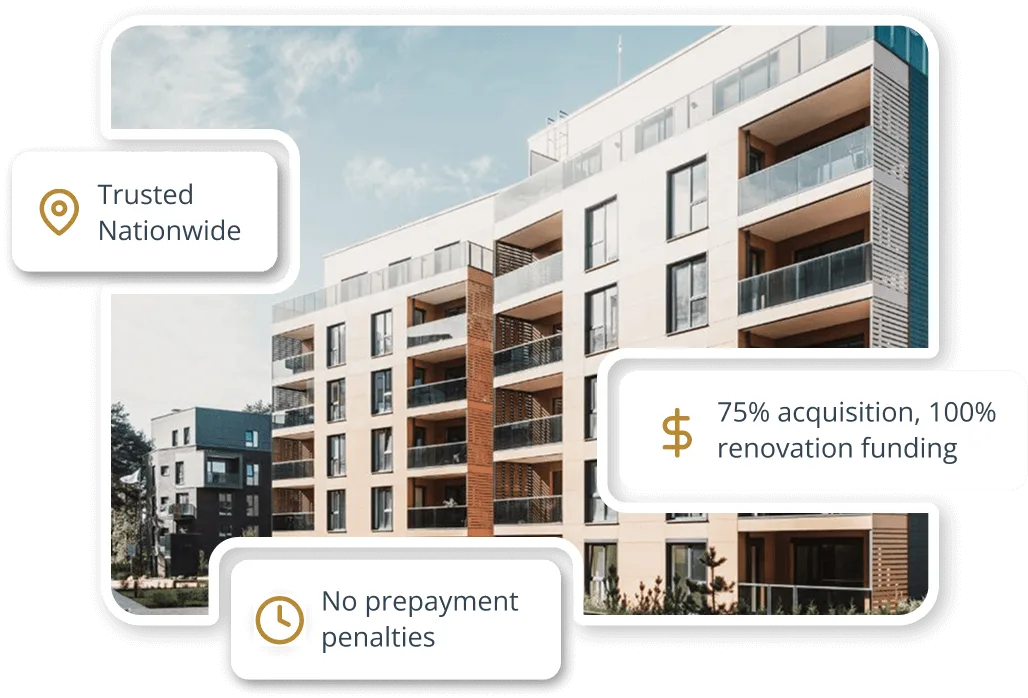Bridge Loans for Multi-Family and Mixed-Use Investments
Discover flexible financing to renovate or refinance your multi-family and mixed-use investment properties. Our easy, fast lending bridge loan process speaks for itself.



2500+
Happy Clients
$1B +
Funded Projects
95%
Applications Approved
Apply for a Bridge Loan
Fill in our form below to apply for a Bridge Loan with Express Capital Financing. The form will take around a minute to complete. One of our experienced loan officers will be in touch to discuss your application.
Turn potential into profit by securing a bridge loan tailored for multi-family property transformations. Whether you're acquiring, renovating, or refinancing, our streamlined application process and efficient underwriting guarantee you quick access to capital. Benefit from flexible bridge loan terms, expedited funding, and a strategic financing partner dedicated to maximizing your multi-family investment success.

Our Unique Bridge Loan Offerings for Multi-Family and Mixed-Use Properties
- Nationwide lending coverage
- Asset-based loans up to 75% acquisition, 100% renovation cost
- Quick closing, in as little as 2 weeks
- Non-credit-sensitive, approval in 24 hours
- In-house underwriting, funding, and draws
- No prepayment penalties, pay only for what you use
- Efficient back-office support at no extra cost
Our Bridge Loan Terms for Multi-Family and Mixed-Use Investments
We offer transparent and customized terms that can be tailored to fit your needs, so whether you're looking for quick turnaround or longer-term investment opportunities, we've got you covered.
Rate and Terms
| nt_header_0 | Multi Family/Mixed Use Bridge Loans |
|---|---|
| Project Type | Multi Family (5+), Mixed Use |
| Loan Amount | $250,000 - $10,000,000 |
| Loan To Value (LTV) | Up to 75% |
| Rent Coverage Ratio | 1.1x |
| Loan Term | 12 to 36 Months |
| Interest Rate | Starting at 10.5%+ |
| Rehab Financing | 100% |
| Proceed Usage | Purchase, Refinance, Cashout |
| Those Who Qualify | Experienced or Newbies to Real Estate |
| Minimum Credit Score | 650 (Lower is case-by-case) |
| Points | 2%+ |
| Pre-Payment Penalty | None |
Seamless Bridge Financing for Multi-Family & Mixed-Use Starts Here
Experience ease, simplicity, and transparency in your multi-family investments through Express Capital Financing's Bridge Loan program. Our application process, from initial consultation to final funding, is meticulously tailored for straightforward success. Navigate the complexities of multi-family and mixed-use ventures with confidence, backed by our streamlined financing solutions.
Discuss Your Deal and Goals
Connect with your dedicated bridge loan officer to discuss your unique project and financial objectives.
Customized Loan Quote
We’ll prepare a personalized bridge loan quote, crafted specifically for your project, so it aligns perfectly with your goals.
Document Collection and Review
Our streamlined process involves collecting and reviewing the necessary documentation, making the paperwork hassle-free for you.
You’ve Secured Funding
It’s time to get excited about your project becoming a reality with Express Capital Financing.
Why Choose Express Capital Financing For Your Next Multi-Family and Mixed-Use Investment?
Express Capital Financing offers unmatched flexibility with bridge loan terms and approval criteria. We're willing to collaborate with borrowers who have less-than-perfect credit scores, unique property types, or unconventional financial situations. Each Multi-Family and Mixed-Use Bridge loan is assessed individually, resulting in personalized loan structures to meet your specific needs.
Quick Funding
Get fast, reliable financing to seize opportunities with unmatched speed.
Maximum Leverage
Maximize your real estate portfolio effortlessly with higher leverage.
Unmatched Flexibility
Enjoy tailored loans that flexibly adapt to your needs and goals.
Multi-Family and Mixed-Use Bridge Loan Success Stories
Explore firsthand accounts, success stories, and testimonials that showcase the effectiveness of our bridge loans for multi-family and mixed-use properties. Our customers have experienced the power of our investor-friendly terms, efficient funding, and unwavering support, resulting in successful property transformations and profitable multi-family and mixed-use investments.
Bridge Loans For Multi-Family And Mixed-Use FAQs
A bridge loan is designed to "bridge the gap" between immediate capital needs and long-term funding. It’s ideal for real estate investors who need quick cash to seize opportunities, like buying a property before selling another, without missing a beat.
If you'd like to find out all the finer details, take a look at our guide "Understanding bridge Loans".
A bridge loan gives you quick access to funds, typically secured by the property you’re buying or already own. You use it to cover costs, like a down payment or renovations, until you secure permanent financing or sell an asset.
Repayment usually happens in a lump sum within 6-36 months, often with interest-only payments along the way.
It’s all about speed and flexibility to keep your project moving.
You can find more about bridge loans in our guide "Understanding Bridge Loans".
If you're a real estate investor, you might be interested in our guide "Bridge Loans for Real Estate Investors".
A multifamily bridge loan is a short-term financing option tailored for properties with 5+ residential units like apartment buildings. It’s your go-to for acquiring, rehabbing, or stabilizing these income-generating assets before locking in long-term financing. At Express Capital, we craft these loans to maximize your portfolio’s potential with speed and ease.
You can learn more about how to get started with multifamily bridge with our article "Investing in Multifamily Properties: The Pros, Cons and How to Get Started"
A mixed-use bridge loan targets properties that blend residential and commercial spaces, like apartments above retail shops.
It’s a short-term solution to fund acquisition, upgrades, or repositioning, giving you the flexibility to boost value fast.
If repayment stalls, options include requesting an extension, refinancing with another bridge loan, or selling the property.
In the worst case, a default could lead to foreclosure, but we can work with you to avoid that.
Our guidance would be to have a solid exit plan upfront, whether selling or refinancing.
Yes. Bridge loans are ideal for renovations, whether it’s updating units in a multifamily building or revamping a mixed-use space.
Funds cover construction, repairs, and upgrades, boosting value fast.
If you're looking specifically for information on bridge loans for property renovations, take a look at our article on understanding bridge loans.
Bridge loans usually run 6 months to 3 years, with interest-only payments keeping your cash flow light during the term. Loan amounts can range from $500K to $10M (or more with the right lender), depending on your project. Expect higher interest rates than traditional loans, but the trade-off is speed and flexibility, perfect for time-sensitive deals.
Contact us today to find out what loan terms we can offer for your project.
While traditional lenders might demand a 700+ FICO score, we’re more flexible at Express Capital. A score above 650 is ideal, but it’s not the whole story. We focus on your property’s value and investment history too.
If you think you have a poor credit score, we have options to keep your deal alive.
Contact us today to find out what loan terms we can offer for your project.
It is possible. We’re more focused on your property’s equity and your exit strategy like selling or refinancing. If the deal makes sense, we’ll work with you to structure a loan that fits.
This approach will vary lender by lender.
You’ll need a loan application, property details (appraisal or valuation), the project plan (scope of work), and a proforma rent roll.
We might ask for financials like bank statements.
Contact us today to find out what documentation we would require for your project.
Interest rates typically range from 10.5% to 12%, depending on your credit, property, and market conditions. They’re higher than conventional loans because of the short-term risk and speed we deliver.
At Express Capital, we tailor rates to your deal, competitive yet fair, so you can maximize returns without breaking the bank.
Yes, and expect some extras such as origination fees (1-3% of the loan), closing costs, and sometimes appraisal or legal fees.
Prepayment penalties? Not always but many lenders, including us, skip them to keep your options open.
We aim to be transparent about all fees, so please contact us today to discuss your project.
LTVs usually top out at 65-75% based on the property’s current value or after-repair value (ARV) for rehab projects.
We push higher leverage when the deal’s solid, up to 85% LTC (loan-to-cost), so you can stretch your capital further and seize bigger opportunities.
Not always. Some lenders do add on penalties. We want you to pay off early if it works for you, like after a quick sale or refinance.
We recommend checking the terms with your lender.
With ECF, you can close in as little as 7-14 days. This can sometimes be faster with pre-approval.
Traditional lenders can take up to 30-45 days.
Contact us today to discuss your project, and we'll be able to give you a more accurate estimation of when your bridge loan would be secured.
We look at the property’s value (current and post-rehab), your equity or down payment and your exit strategy; selling or refinancing.
Credit and income tend to matter less than with banks; it’s all about the asset and your plan.
We finance multifamily (5+ units), mixed-use (residential + commercial), and even trickier assets like distressed properties or those needing rehab.
If you're looking to finance a commercial-only or land property, that is less common but possible with the right lender.
Take a look at our article on single vs family property investments for more information.
If you are looking to finance a 1-4 unit property then please take a look at our fix and flip loan page for more information.
Yes, cross-collateralization lets you bundle multiple properties into one loan, boosting your borrowing power.
If you have equity in a few assets, we can structure it to fund a bigger play. To do this, we'd be looking to ensure the total LTV and exit strategy align.
Contact us today about your project to see what we can achieve for you.
Yes.
We can also help you find the right type of bridge deal for your project. For more information on the types of bridge loans we have to offer, take a look at our loan program page.
To avoid making any unnecessary mistakes, take a look at our "Top 5 Mistakes to Avoid in a Ground-Up Construction Project" article.
Market swings impact rates and terms. Hot markets might mean tighter LTVs or higher rates due to demand; slow markets could ease terms to attract borrowers. Property values and rental trends also play a role.
We attempt to stay nimble and adjust to keep your deal competitive.
We recommend that you look for speed, flexibility, and transparency.
Check their track record with multi-family and mixed-use projects, compare rates and fees, and ensure they get your goals.
If you'd like to find out if we're the right lender for your project, please feel free to contact us today.
Sometimes. Banks have the potential to be slow and strict, with around 30-60 days turn around time and heavy credit checks. They can also often come with less leverage meaning that more money will be required to close. To counteract this, they might have a slightly better interest rate.
They’re less keen on short-term, high-risk deals like bridge loans.
To find out what type of lender would be most appropriate for your project, feel free to discuss your project with us.
Yes. It’s a common exit strategy.
Once your property’s stabilized, post-renovation or leased up, you can refinance into a conventional mortgage with lower rates.
Express Capital Financing proudly offers multi-family and mixed-use bridge loans nationwide, covering all 50 states! From New York to California, Texas to Florida, we’ve got you covered with fast, reliable financing wherever your next opportunity lies.
